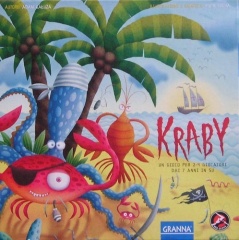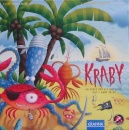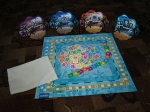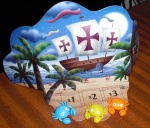Kraby

Autoren:
Illustratoren:
Genres:
Spielmechaniken:
Release:
2012
Anzahl der Spieler:
2 bis 4 Spieler
Spielzeit:
30 Minuten
Altersfreigabe:
Frei ab 7 Jahre
Time to catch some crabs! Not for dinner, mind you, but to sell to markets for a grand haul. In order to make the most for your efforts, you want to concentrate on those crabs grouped together in large sets. Otherwise you're piddling away time spent chasing individual crabs, which is hardly worth the bother. The fishermen who nets the most valuable haul wins the game.
Set-up in Kraby differs depending on the number of players, with 80 or 120 tiles in play, the game board being 9x9 or 11x11, and the number of colored crab figures being 10, 12 or 15. Each player starts by secretly drawing six crab tiles (which come in four colors with two players and five colors otherwise) and placing them behind their screen. On a turn, a player chooses one tile and enters it from any side of the game board, sliding it in the row or column until it hits the island at the center of the board or another tile in play. (A move that would slide a tile off the board or create an impossible-to-fill space is illegal.) The player then draws a new tile and places it behind his screen.
A player then has the option of placing one of the colored crab figures in his ship's hold. Each ship has three holds, with a scoring multiplier of x1, x2 or x3. A player can claim a color only once and cannot place it on the same multipler as another player. In a four-player game, a player can claim only two figures.)
The game ends once the final tile has been placed and the game board filled. Each group of crabs in the same color, with orthogonally adjacent crabs belonging to the same group, is worth -1 to 5 points depending on its size. Once the value of a color is determined, each player scoring this color multiplies this value – which might be negative – by the multipliers showing on his ship's hold. The player with the highest score wins.


